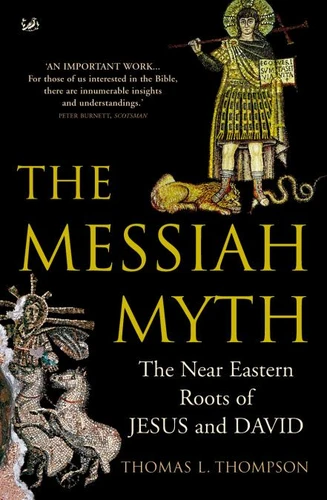The Messiah Myth. The Near Eastern Roots of Jesus and David
Par :Formats :
Disponible dans votre compte client Decitre ou Furet du Nord dès validation de votre commande. Le format ePub protégé est :
- Compatible avec une lecture sur My Vivlio (smartphone, tablette, ordinateur)
- Compatible avec une lecture sur liseuses Vivlio
- Pour les liseuses autres que Vivlio, vous devez utiliser le logiciel Adobe Digital Edition. Non compatible avec la lecture sur les liseuses Kindle, Remarkable et Sony
- Non compatible avec un achat hors France métropolitaine
 , qui est-ce ?
, qui est-ce ?Notre partenaire de plateforme de lecture numérique où vous retrouverez l'ensemble de vos ebooks gratuitement
Pour en savoir plus sur nos ebooks, consultez notre aide en ligne ici
- Nombre de pages432
- FormatePub
- ISBN978-1-4464-2585-5
- EAN9781446425855
- Date de parution31/03/2013
- Protection num.Adobe DRM
- Infos supplémentairesepub
- ÉditeurVintage Digital
Résumé
Since the eighteenth century, scholars and historians studying the texts of the Bible have attempted to distil historical facts and biography from the mythology and miracles described there. That trend continues into the present day, as scholars dissect the gospels and other early Christian writings to seperate the 'Jesus of history' from the 'Christ of faith'. But in The Messiah Myth Thomas L. Thompson argues that the quest for the historical Jesus is beside the point, since the Jesus of the gospels never existed.
Like King David before him, the Jesus of the Bible is an amalgamation of themes from Near Eastern mythology and traditions of kingship and divinity. The theme of a messiah - a divinely appointed king who restores the world to perfection - is typical of Egyptian and Babylonian royal ideology dating back to the Bronze Age. In Thompson's view, the contemporary audience for whom the Old and New Testament were written would naturally have interpreted David and Jesus not as historical figures , but as metaphors embodying long-established messianic traditions.
Challenging widely held assumptions about the sources of the Bible and the quest for the historical Jesus, The Messiah Myth is sure to spark controversy and heated debate among believers and sceptics alike.
Like King David before him, the Jesus of the Bible is an amalgamation of themes from Near Eastern mythology and traditions of kingship and divinity. The theme of a messiah - a divinely appointed king who restores the world to perfection - is typical of Egyptian and Babylonian royal ideology dating back to the Bronze Age. In Thompson's view, the contemporary audience for whom the Old and New Testament were written would naturally have interpreted David and Jesus not as historical figures , but as metaphors embodying long-established messianic traditions.
Challenging widely held assumptions about the sources of the Bible and the quest for the historical Jesus, The Messiah Myth is sure to spark controversy and heated debate among believers and sceptics alike.
Since the eighteenth century, scholars and historians studying the texts of the Bible have attempted to distil historical facts and biography from the mythology and miracles described there. That trend continues into the present day, as scholars dissect the gospels and other early Christian writings to seperate the 'Jesus of history' from the 'Christ of faith'. But in The Messiah Myth Thomas L. Thompson argues that the quest for the historical Jesus is beside the point, since the Jesus of the gospels never existed.
Like King David before him, the Jesus of the Bible is an amalgamation of themes from Near Eastern mythology and traditions of kingship and divinity. The theme of a messiah - a divinely appointed king who restores the world to perfection - is typical of Egyptian and Babylonian royal ideology dating back to the Bronze Age. In Thompson's view, the contemporary audience for whom the Old and New Testament were written would naturally have interpreted David and Jesus not as historical figures , but as metaphors embodying long-established messianic traditions.
Challenging widely held assumptions about the sources of the Bible and the quest for the historical Jesus, The Messiah Myth is sure to spark controversy and heated debate among believers and sceptics alike.
Like King David before him, the Jesus of the Bible is an amalgamation of themes from Near Eastern mythology and traditions of kingship and divinity. The theme of a messiah - a divinely appointed king who restores the world to perfection - is typical of Egyptian and Babylonian royal ideology dating back to the Bronze Age. In Thompson's view, the contemporary audience for whom the Old and New Testament were written would naturally have interpreted David and Jesus not as historical figures , but as metaphors embodying long-established messianic traditions.
Challenging widely held assumptions about the sources of the Bible and the quest for the historical Jesus, The Messiah Myth is sure to spark controversy and heated debate among believers and sceptics alike.



